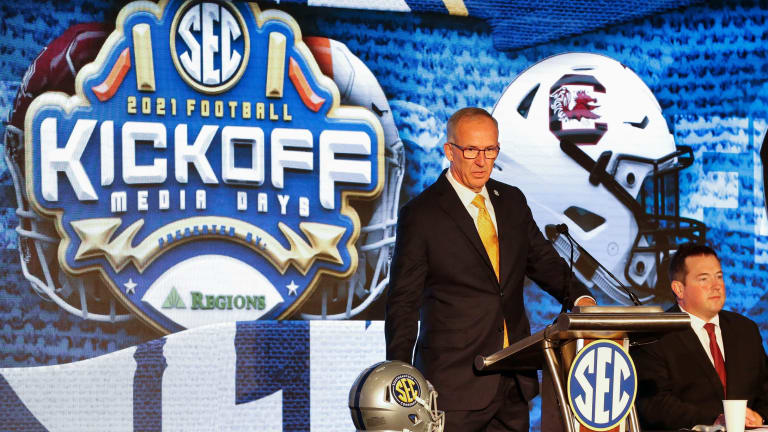
Mr. CFB: Greg Sankey's Message At SEC Media Days: Get Your COVID-19 Shot And Get It Now

Hoover, Ala.—SEC Commissioner Greg Sankey pulled no punches Monday as he opened the league’s annual football media days.
Sankey’s message?
Get your COVID-19 shot. And get it now.
Sankey told the assembled media, whose attendance had been reduced because of concerns about the virus, that as of now, six of the SEC’s 14 teams have reached an 80 percent vaccination rate.
That’s not good enough, the commissioner said.
“That number needs to grow and grow rapidly,” said Sankey, who became the SEC Commissioner on June 1, 2015. “We have learned how to manage through a COVID environment but we do not have control of a COVID environment and that finds us preparing to return towards normal this fall but we see realities all around us.”
Despite the progress that has been made, the virus is still having a negative impact on the world of sports:
The N.C. State baseball team had to leave the College World Series because of a COVID outbreak.
The Yankees and Red Sox had to postpone a game on July 15 due to an outbreak.
U.S. Olympians, including tennis player Coco Gauff, had to withdraw from the summer games in Tokyo after testing positive.
Golfers, including former champion Zach Johnson, had to withdraw from the British Open because of positive COVID tests.
Last season the SEC played a 10-game, conference-only football schedule that did not start until Sept. 26 and included extra open dates for maximum flexibility when it came to rescheduling games.
The SEC scheduled 70 regular-season games and a conference championship game.
The goal was to move Heaven and Earth in an attempt to get most of the games played. A lot of games had to be moved or delayed but when the season was over, the SEC had played 69 games. The only games not played were Ole Miss at Texas A&M and Vanderbilt at Georgia.
It was an incredible logistical accomplishment. No other conference came close to playing 97 percent of its scheduled games. And when the season was over four SEC teams (Alabama, Texas A&M, Florida, Georgia) were in the final CFP Top 10 and Alabama had won another national championship.
Sankey made it clear that such extraordinary measures to play the games will not be taken this year. In fact, Sankey will recommend that last season’s 53-player minimum to play a game be lifted.
The message was clear: “You’re expected to play as scheduled,” he said.
The most effective way to avoid the possibility of cancelling games, said Sankey, is to increase number of people that are vaccinated.
“Let me be clear to our fans, our coaches, to our staff members and our student athletes,” said Sankey. “COVID 19 vaccinations are widely available. They have proven to be highly effective. And when people are fully-vaccinated we have the ability to avoid serious health risks, reduce the virus’s spread and maximize our chances of returning to a normal college football experience and to normal health.
“With six weeks to go before kickoff now is the time to seek that full vaccination. And we know nothing is perfect but the availability and the efficacy of the COVID-19 vaccines are an important and incredible product of science. It’s not a political football.”
Sankey also used Monday’s platform to address the unprecedented change that is facing college athletics:
**--The transfer portal now makes it possible for football players to leave one school for another without sitting out a year. Players may wait as late as May 1 to declare.
**--On July 1 players became eligible to accept cash and other financial considerations for the use of their Name, Image, or Likeness (NIL).
**--The College Football Playoff is strongly considering expanding from four to 12 teams after the 2023 or 2025 regular season.
**--NCAA President Mark Emmert suggested last week that the time had come to turn over aspects of governance and rules enforcement to the conferences. Translation: The NCAA as we have always known it is coming to an end.
“All of that illustrates the reality that we must change,” said Sankey, who has emerged as the de facto voice of leadership in college athletics over the past few years. “But as we think about change we must remember that not everything is broken around college sports.”
In fact, this time last year we didn’t even know if we would even have a college football season 2020. But thanks to Sankey’s leadership we did, even if it was surreal at times. We are not back at normal but we are trending in the right position. People I talk to are incredibly excited about the 2021 season.
“The potential absence of college football and the reality of an abbreviated season with limited attendance made us all realize how much we appreciate college football, what it means across our nation,” said Sankey. “But most importantly, I think we saw what it means to young people who participate in the game of college football.”
Okay. That’s your pep talk for today. Now go get your shot.